#anti penelope ebrim
Text
Power Dynamics Pt 2 - The Ladies of the Court
(Click here to read the rest of Hana Lee: A Study in Erasure!)
Previous: Power Dynamics, Part 1 - The MC
"White feminism swears it will unlock the door to equality and let us all in if we will just hoist her through this window
on our backs
and ain’t that just like white feminism, always getting up on someone else’s back." - Rachel Wiley, "The Dozens".
--
From the beginning of the series, the Ladies of the Court - Madeleine, Olivia, Kiara and Penelope - have represented "the court". All four were born and brought up in Cordonia, all are noblewomen from prominent estates. Of them, two already possess titles (Duchess Olivia and Countess Madeleine) and two are heirs to the estate, whose parents run the Duchies. The MC joins the ranks of these women in TRR3, when Liam gifts her the province of Valtoria.
Hana, however, does not. Even though she is part of the court, and one of their most versatile courtiers, she is the only woman who gets neither titles nor lands of her own in canon.
Why? This is an important question, and is in fact the whole point of this section - but before I get down to answering that, I think we need to look into how the narrative situates the other women, and empowers them (or not).
I will be looking at the kind of treatment these women get, on two counts:
1. Political Power: What status and titles do they hold within the heirarchy of Cordonia, how do people interact with them both when they're in power and when they're out of it. If they cause harm while in power, how often do they face the consequences? Does the narrative try to mitigate these?
2. Narrative Agency: How does the narrative handle their personal issues? When they're in a moment of crisis, what opportunities does the narrative offer to help them? If you have a choice to not take up those opportunities, do you face consequences?
And most of all - what does the narrative allow them that they rarely ever allow Hana? How does this affect Hana's story?
Penelope
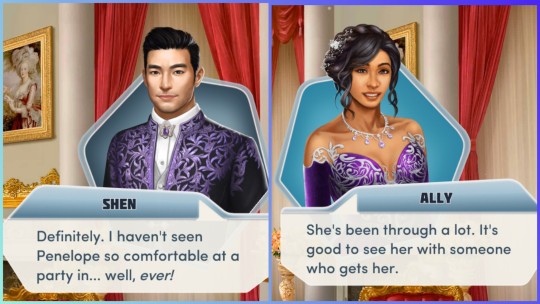
I start this essay with Penelope, because while she doesn't have much political standing, the narrative has figured out how to frame her positively while still retaining her in a "follower" sort of role, which otherwise would be seen as a liability. This wasn't a framing they had planned, or had worked towards from the beginning. For instance if you look at TRR1, Penelope starts out like most of the courtiers - gossipy, classist (in response to one dialogue option, she even calls the MC a "commoner wench"), laughing if the MC fails.
She changes into the "ditzy", poodle-loving courtier in the second half of the book, completely shedding her "I'm-not-nice", classist outlook by the finale so that the only thing we remember about her is her love for poodles. But even then, there is zero indication of her eventual role in the plot against the MC - none of her scenes in TRR1 show any signs of discomfort or guilt. It is entirely possible that she was included in the list of people involved long after the end of Book 1.
Interestingly, by the time we find out she was guilty both of sending Tariq to our room and paying the photographer, we're also given hints that she suffers from social anxiety. I've written before about the great lengths the narrative has us take to make her comfortable, so I will not elaborate on those here. But it is important to note how things change immediately after we question her:
1. After TRR2 Ch. 10, Penelope's involvement in the plot against us is never mentioned again. The narrative treats it as if it had never happened
2. Madeleine treated Penelope like a servant during the engagement tour, and constantly berated her. The narrative reminds us of this during our first visit to Portavira, and during our own bachelorette party, if we simply point out that she hasn't followed the dress code.
3. Multiple options are given to the MC, to make Penelope feel comfortable in TRH. Whether it is helping her dance at a Texan bar, or helping her decide what question to ask during truth or dare. In TRH3 we wind up so involved in her wedding that we become both her bridesmaid and her officiant, our child becomes her flower girl, we can give her a bachelorette party if we spend diamonds, and we even help her pick out lingerie (this is not even to talk about how we can encourage her to handle the situation with her ex-husband). All so her father will not vote to have our child snatched from us.
A lot of her storyline after the TRR2 reveal revolves both around her deciding whether she wants to be part of court or not, and her relationship with Kiara's brother Ezekiel, which culminates into marriage in TRH3. In both of these arcs, her comfort is tantamount. In the latter case, one can even say that Ezekiel himself - despite being Kiara's elder brother - exists solely to be Penelope's love interest.
Penelope doesn't have a lot of political power - but a lot of that is out of choice. Her parents run the estate that will one day pass on to her. She has no prominent positions in the royal council, and is generally seen more often at balls, functions and parties. TRR1 and 2 have her (reluctantly) be part of the court, and in both cases one could say that the narrative has someone more powerful prey on her. In TRR1 (though I'm pretty sure it wasn't planned when they were writing it), it was Constantine and Bastien...in TRR2 it was undoubtedly Madeleine. But once we find out about her social anxiety and how deeply uncomfortable she feels in public settings, the MC can provide solutions (such as bringing her poodles along) and keep her safely away from court. She eventually turns her talent for sewing pet fashion into a profession, and spends very little time on the politics of the country. Her father, instead, becomes Portavira's representative to the Royal Council and we later find out her mother has joined the Via Imperii.
Penelope is clearly not the type of character that leads others, or takes a lot of initiative. Unlike Madeleine or Olivia she doesn't have a lot of strong opinions, and when mistreated she struggles to push back. Despite this, the narrative makes sure she has agency within the text. Until TRH3 with Madeleine, Penelope was the only courtier the narrative made script-diversions for, depending on the MC's behaviour and words. She could refuse to engage with us (despite being guilty of betrayal) if we weren't nice to her in Paris, she could reject our offer to join the Unity Tour if she couldn't trust us to protect her. Interestingly, even if the MC is not interested in being nice to Penelope, other people in the core group step up to that role. In the investigation it is Hana, and from Book 3 onwards, it is Drake who becomes protective of her, and angry when someone tries to harm her (he tells a worried Penelope that they won't let Madeleine do anything to her at the Unity Tour. At Penelope's wedding he seems bizarrely invested in the whole Guy-Penelope-Zeke drama. Yes, the same trauma-minimizing Drake Walker). The narrative ensures that she has protection, both in the group and with her parents, and she is allowed to reject things she feels uncomfortable doing. The MC is often expected to accommodate her, and the general consensus seems to be that she's "been through a lot" and deserves the world.
You know who else has been through a lot and deserves the world? Hana.
Hana and Penelope may be very different people, and both clearly have very different moral compasses. But we can often see parallels between their stories in canon. Some of this is unconscious - but in at least one case the narrative makes an obvious connect.
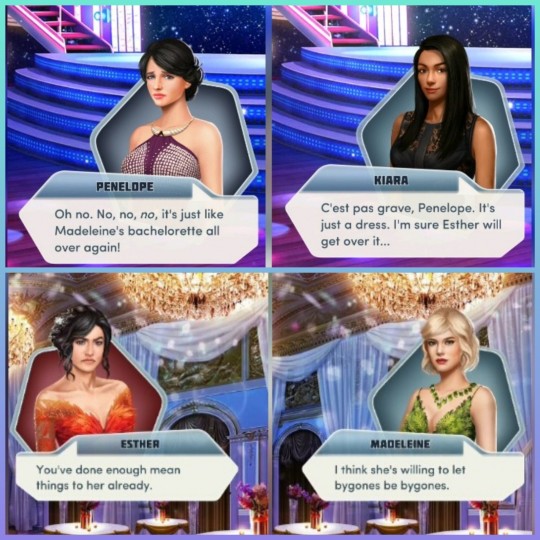
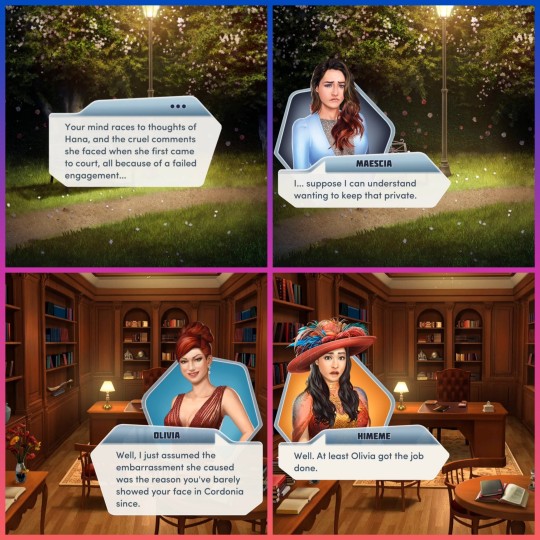
The parallels come up most in two instances - one, about Madeleine's bullying during her engagement tour, and two, when Penelope's ex tries to blackmail her. Both Penelope and Hana were at the receiving end of Madeleine's bullying, and both Penelope and Hana had a broken engagement/marriage. The MC comforts Penelope, but ignores the magnitude of what Hana went through - even to the point of normalizing Olivia's mockery of it.
The difference between the two is that Penelope is allowed to voice her grievances, and everyone else has to readjust their expectations to accommodate her. In Hana's case the narrative either engages in complete erasure, or in using her to highlight someone else's plight. When it came to Madeleine's bullying, Hana was forced not only to pretend that she was okay with her, but to outright lie about the events of Madeleine's bachelorette in a dialogue option.
The narrative gives Penelope the space to react negatively to people who harm her, while never needing to take full responsibility for how she harmed an innocent person. The same narrative robs Hana of this space, both for the comfort of the characters at fault, and for the MC's benefit. Penelope can expect kindness and support, Hana is expected to only give it. There is a pattern of giving Hana as much pain as possible that then goes unresolved, because working on that would be inconvenient to whatever the group's goals are at the time. So when they use Hana's broken engagement only to drum up sympathy for Penelope, while subjecting Hana herself to scorn and mockery for the same...what else can such a narrative be called, but heartless?
Madeleine
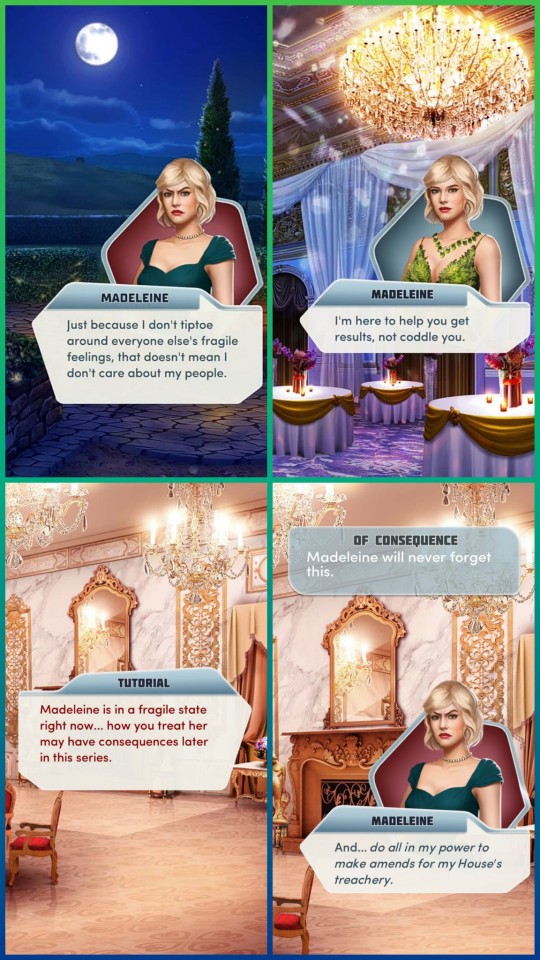
Madeleine is perhaps the only recurring peer-age character who comes from TRR's parent series, Rules of Engagement. In both series' one writer, Jeffrey, was assigned her scenes. This is what he had to say about her in an interview before TRR2 dropped:
It's fun to write someone who's constantly trying to spin a situation to their benefit, and making power plays along the way. I've actually been writing for Madeleine since her appearance in Rules of Engagement: Book 2, so we're practically besties.
And this sentiment was obvious from the way Madeleine was written. She may be just a Countess, but whenever she makes an appearance, the writing places her in a position of power and authority among peers no matter the title the other person holds. She is a clear frontrunner from the moment she enters, and commands absolute respect and obedience from the courtiers as Queen-to-be (especially in the face of her taunts and insults). It is worth noting that in TRR3, when she is the MC's employee, she is allowed to order her around, insult her intelligence, and blame her for "not learning" without any exploration into her own poor work ethic (eg. the 100-or-so notecards she expects us to learn in 10 minutes). She is never really required to treat the MC - Queen or Duchess - with the same respect she'd once demanded of other courtiers. It is no wonder then, that in TRH we have to "tiptoe around her fragile feelings" to gain her "loyalty", and that the narrative blames us for her betrayal. Yet this principle was never once applied to Madeleine when she held power - not when she treated a lady from a Great House like a servant, not when she enjoyed breaking the spirit of one of her courtiers. In fact, her behaviour as Queen-to-be gets to be described by the MC as "not lying or cheating to get her way, just playing smart"(!)
From the moment she enters the social season, she is viewed by the others with a mixture of intimidation and awe. Even Olivia, who hates her the moment she realizes Madeleine is a rival, insists at first that we call her by her title (Countess Madeleine of Fydelia). Olivia and the MC become frontrunners as a result of their personal equations with Liam, but Madeleine gets ahead through her connections with his parents. If the MC doesn't gain anyone's alliance, Madeleine is deemed the only real choice (Olivia, too, is viewed as unfit for the role). She is so confident of her win, in fact, that she doesn't even bother to communicate with Liam until it's clear he prefers the MC, after which she makes an offer pre-coronation to allow his relationship with the MC to continue, under the condition that he marries her and makes her Queen. And it is Constantine's machinations that turn this imaginary scenario into a reality.
Madeleine's engagement to Liam changes court dynamics: the arrival of a new Queen-to-be brings with it a structured court, with ladies-in-waiting who must pledge their loyalty to her to survive. At the beginning of TRR2, both Kiara and Penelope approach the MC nervously to inform her that they can no longer be seen talking to her. Kiara can even admit that they could "get into trouble for talking with you this long" if the MC is understanding enough. And while being a LIW is a position of honour, Madeleine doesn't hesitate to treat them like servants instead, and compares women like the MC and Hana to dogs.
Her power becomes most prominent when it comes to Penelope and Hana, who are viewed as the "sweeter" ladies in the court. She constantly berates Penelope for her mistakes and labels her a disappointment, suggests Kiara exoticize herself to two suitors, and finds the idea of "breaking Hana"…fun.
She does this knowing she isn't Queen yet, knowing that her entourage includes women from the Great Houses. Her depiction in TRR2 is that of a power-hungry, sadistic woman, whose duplicity and self-interest towers over any sense of duty, and who doesn't seem to care that her actions may have consequences for herself and the Royal Family. It wouldn't be too far-fetched to say that had she and Liam stayed engaged by the Homecoming Ball, recruiting the other duchies into an alliance would have been an impossible task given the bridges she'd burned.
Yet, by TRR3, the same narrative tries to convince us that she is a patriot, a capable politician and brilliant when it comes to identifying what would be good for optics. How did the writers manage this?
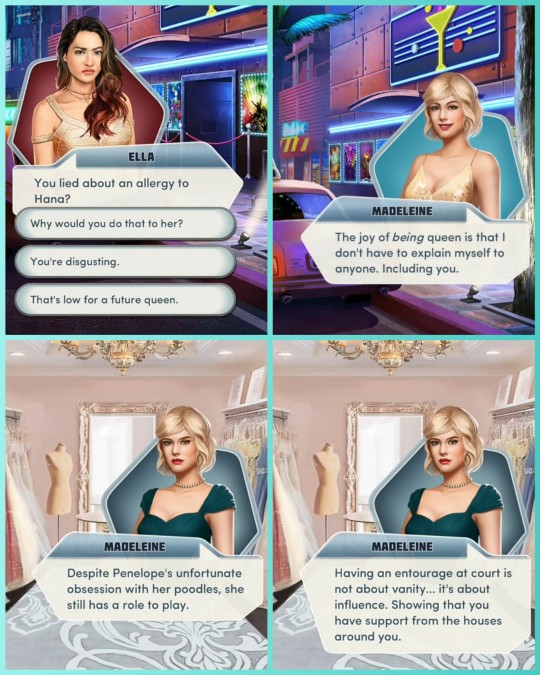
I wish I could say it was just plain retconning, but that would be too simplistic and imply that the writers merely forgot. To understand how we got here, we need to see her appearances from the beginning of TRR2 to the early chapters of TRR3.
The narrative begins with the MC determined to clear her name and free Liam from his engagement with Madeleine (whether she loves him or not). In the first chapter itself, Bertrand tells us that the only way Liam can break this engagement is by presenting evidence that doing so would be in Cordonia's best interests. Which means that his current choice has to be proven guilty of something, not his past one proven innocent. This builds up some expectation that Madeleine may be involved in the plot.
Now, whether or not they originally intended that, is a mystery...but all the writing before Ch. 7 points to Liam getting out of the match through a discovery that Madeleine or her family was involved in something shady. The sharp pivot to Penelope doesn't even get build-up until Ch. 6, just one chapter prior. Whether this has to do with Madeleine being a particular writer's favourite, is anyone's guess, but the truth is that if Madeleine was really just meant to be a red herring, they wouldn't have waited till Ch. 6 to provide buildup for Penelope's betrayal.
Scattered throughout the first half of TRR2, are comparisons between the MC and Madeleine - much of it related to power, diplomacy and crisis-management. The MC is still the underdog at this point, but she is asked about - or placed in - situations where she can choose to act differently from the current Queen-to-be, or claim an equal level of competence. Her charm and friendliness is an alternative to Madeleine's power-mongering coldness. Madeleine's bachelorette is the tipping point of this dynamic, where her behaviour crosses over from merely calculating to downright sadistic. Her craven pleasure in hurting Hana achieves nothing but momentary self-gratification, and her response to the MC's (optional) accusation about it being "a low blow for a queen" proves that she has no real respect for the role bequeathed to her.
However, once this scene is over with and the focus shifts to Penelope, Bastien and the royals themselves, Madeleine recedes to the background. From the tea party in Paris to her disastrous wedding shower in New York, we see very little of her, and none of her past actions come up in the story. Instead, we hear about her from her mother Adeleide, who conveniently leaves us sympathetic hints about the stress she is under, and the finale shows us a Madeleine devastated by her failure, giving us warnings. By the time we got to the TRR2 finale, the constitutional clause that seemed to hint at implicating her was forgotten, and by TRR3 she magically became a Patriot with Daddy Issues. I was playing this series as it was coming out, and by the time we met her again in Fydelia, memories of the "chocolate incident" seemed vague (a chunk of fandom constantly downplaying the incident didn't help either).
The structure of the narrative facilitated this: when the incident itself was still fresh in our memories, we were being bombarded with other incidents (Penelope's betrayal, discovering Savannah), and the "resolutions" given for Hana in comparison were rushed and half-baked. Once we got some distance from the events of that bachelorette, the narrative could then subtly rewrite the entire episode, both in Madeleine's dialogue and that of others, so that Madeleine's own words, own actions, could be erased.
And yet...Penelope - Madeleine's other victim - is never forced to sugarcoat what Madeleine did to her, nor does the group forget/minimize it. Penelope doesn't go into lurid detail about it - she doesn't need to. The narrative makes it clear to us that Madeleine's behaviour affected her. The entire point of gaining her alliance in TRR3 is to prove to her that we aren't Madeleine. Even though Madeleine herself never has to personally bear the consequences of what she did to Penelope, it is clear that the latter will be protected if she chooses to come with us.
Hana's case couldn't be any more different, and part of that has to do with the narrative not permitting her to have a voice in this. At the beginning of TRR2 itself, Hana is made beholden to Madeleine, because Madeleine "brought her back" and therefore has the power to send her home in disgrace anytime. But we find out that very night that this is, at best, a half-truth. Not from Hana, not from Liam who made that deal with Madeleine. The person who got to tell us this was Drake and it is never discussed outside of his scene.
Hana is never allowed to tell us herself the full truth of her return. The narrative never lets her acknowledge this to anyone, instead making her play along with Madeleine's half-truth rather than use that knowledge as leverage. Within that time, she does whatever Madeleine tells her, expresses gratitude, and doesn't push back in the face of multiple threats. Nor do her friends bother to protect her. Had the flashback scene with the three LIs gone to Hana instead, and it had been openly acknowledged by the MC in conversation with Hana: all of the above would have sounded very, very bizarre. The narrative itself seemed to want Hana in a position of servitude, and therefore grants her absolutely no agency in the face of her suffering. Even the MC's choice to call Madeleine out, results in a situation where only half the truth comes out, and the MC makes no further efforts to set the record straight. This leaves Hana in a potentially dangerous situation that even she is never aware of. In the next book, the MC minimizes what Madeleine did to just "mean things" (and this is only by option), Madeleine claims that Hana would be willing to "let bygones be bygones", and Hana herself is made to (optionally) lie about the events of that night (and throw Kiara under the bus as well).
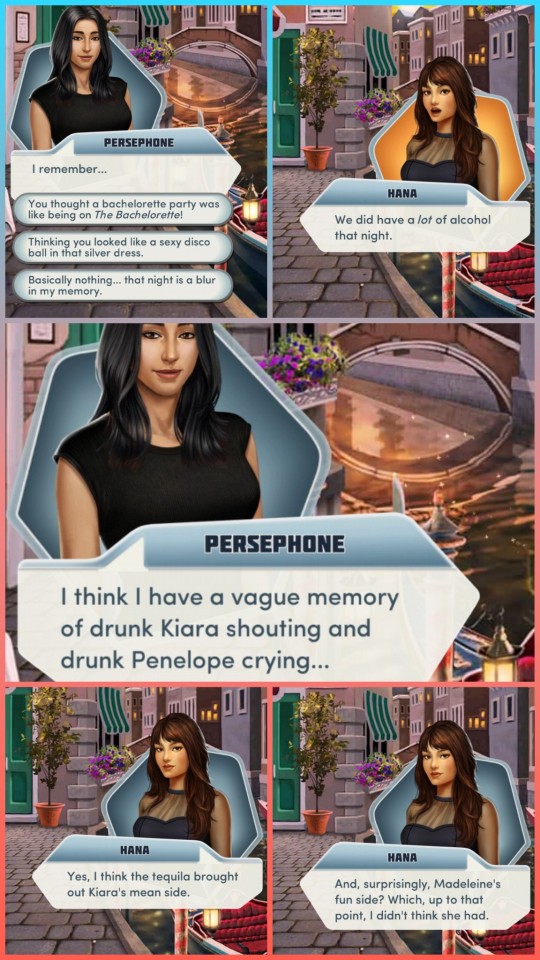
It isn't surprising that this erasure occurs around the same time as Madeleine's (optional) admission of her own feelings to Hana in Vegas. This is, after all, a romance that centers Madeleine - that views Hana as a prize for her dedication to Cordonia, her years of pain thanks to her father, and her alliance with the MC. Most of the hints for this romance are about Madeleine's feelings, Madeleine's journey, and - when a lot of us protested - Madeleine's guilt. In the few scenes that promote this romance, Hana is mostly relegated to looking shocked at Madeleine's admissions, or not even there (for instance, Madeleine can imply she wants Hana to the MC in both her scene at the Costume Gala, Ch. 9, or before the MC's reception [if the MC has married Hana]. Hana is absent in both scenes). Hana only gets a chance to say something in their finale scene, which clearly was added in the last minute due to fandom backlash and (from Madeleine's end) is riddled with weak excuses and retcons. Eventually in TRH, the only time Hana gets to even criticize Madeleine is when the latter complains about wearing a country outfit for Savannah's bachelorette, or if Madeleine badgers Hana's wife about getting pregnant (See? Even her criticism of her former bully's entitled behaviour has to benefit someone else, not herself).
Madeleine herself is never subjected to such a lack of care - the MC is rewarded for understanding Madeleine's pain and standing up for her to her parents, and TRH punishes her with betrayal if she doesn't coddle Madeleine for two books straight. And while (if you treat her nicely) Madeleine expresses a recognition that she's getting more kindness from the MC than deserved, such a recognition is purely conditional. In a playthrough where the MC is rude to her, she never needs to introspect or find fault with her own behaviour. Her own betrayal only results in her loss of a job - she is not stripped of her lands and estate, she still stays the Countess of Fydelia. Some may claim this to be a redemption arc, but I don't see what growth or "redemption" is actually feasible, in a narrative that keeps the perpetrator of the abuse safely away from the harsh judgement she should get for the same. The work for her so-called "redemption" comes mostly from us.
The MC is often viewed as a counterpoint to Madeleine, whether there is a romance or not. Both the women are titled ladies, both have some measure of power (in the MC's case, at least by the end of Book 2). Hana is considered socially less powerful than both of them. But the MC is Hana's friend: she is benevolent, she is earthy and relatable, and she has actual people skills, and at least on the surface can behave like her newfound role doesn't change who she is. The narrative uses Hana as yet another indicator that the MC, in a position of power, would be a far better option. But it never actually considers Hana's own journey in the middle of all this, or whether she'd truly be comfortable in the presence of one who found pleasure in harming her. Or whether she can ever trust a friend who kept that information from her. This is just one more source of pain that Hana is meant to bear mostly alone, and when it disappears Hana is expected to be grateful.
Because there is such a lack of thought in the way Hana is written, a pattern exists of the MC showing a lack of concern as well. This is especially obvious in the way she treats the whole Hana and Madeleine episode. Her speaking about it is itself an option, she is allowed to withhold the most damning part of Madeleine's admissions, she doesn't think twice before including Hana in a conversation with Madeleine in Fydelia (TRR3 Ch.3), and she even forgets that Madeleine was fully intending to torment Hana until she broke in the finale. She can be a little insensitive to Madeleine too in TRH, sure, but the narrative punishes her for that. The narrative never punishes her for either hiding the truth, or telling a half-truth to Hana. Hana is expected to make do with whatever little is given to her.
While Madeleine and the MC are viewed as poles apart by canon, and while nothing the MC does can ever measure to the cruelty of Madeleine's behaviour, it is clear that both equations suffer from a gross power imbalance.
Olivia
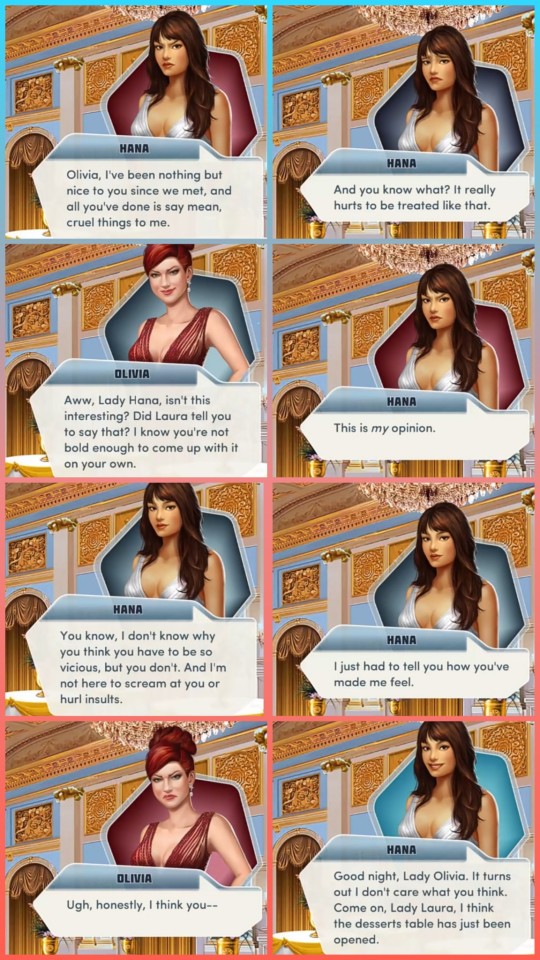
Olivia starts out in the first book as a catty, classist, and impulsive Duchess - not too different from the original depiction of her ancestor and lookalike from TCaTF, Zenobia. But even then, the narrative is very, very eager for us to see her from the get-go as special.
How do we know this? The use of relationship points. We're introduced to the concept through the love interest, but the only person who is coded consistently for three books straight with relationship points is Olivia. We get multiple opportunities, from the encounter in the dressing room before the Derby, to the famous TRR3 scene where we scream her House Motto back to her, to gain her favour and get her to trust us. Gaining her trust is a slow, gradual process, made all the more attractive by the diamond scenes, the little moments where she can acknowledge she likes being our friend, and the background information on her family and her estate Lythikos. She has the added benefit of having one of the story leads involved in her writing, who happens to like the exact character type that she is. Here is what Kara Loo, who has been involved in writing her, said long before TRR was even born (here, she was talking about Val Greaves, but the description fits Olivia perfectly):
I love writing for characters that are a little meaner and will really just say what they’re thinking, even if it isn’t exactly tactful.
Before I get into the Olivia-MC and Olivia-Hana dynamic in particular, it is essential to note what it means when a writer/team leans more towards a particular ideology/political outlook than another, in the course of their worldbuilding. Besides being not-very-diplomatic, both Val and Olivia are written as coming from societies that value physical/military strength - Val is a mercenary (the strong lead, the weak bleed) and Olivia is from Lythikos (if you can breathe you can stand, if you can stand you can fight). A lack of patience for tact and diplomacy, and a tough exterior, tends to be an inherent part of the their worldview (Val however is more open with her emotions, as one can see from her relationships with the other mercenaries, Kenna and Raydan, and eventually her bond with Bubbles). TRR shows us a militaristic way of doing politics through Olivia, and a more diplomatic way through Liam, Hana and Kiara. But it is clear, from the focus given to each and how seriously the writers frame what these characters say, which one the narrative seems to favour more.
Olivia's glorification of violence and toughness is seen as part of her appeal, and while the narrative doesn't outright say so - there seems to be less respect for diplomacy and more peaceful pursuits (eg. How Kiara's family is framed vs Olivia's estate and traditions. Compare the Therons' "Flower Festival" to the tournament Olivia fights in, in TRH3. Which one is framed as vapid and ridiculous? Which one is depicted as a show of strength, and in a more dramatic way?). The books spend far more time and resources in giving Lythikos unqiue Christmas traditions, but hardly has the patience to show traditions that focus on peace, prosperity or art in other places. It is pretty obvious that Olivia's background is viewed as better, and is allowed more space, even though her way of doing things has serious, serious drawbacks. And the excessive pandering to her way of doing things, unfortunately, affects the way Hana is written as well.
From the beginning, the narrative shows a lot of the kind of thrust-and-parry that can occur between a character like Olivia, and a new person like the MC. Unfortunately, the first person to be caught between a confrontation with them is Hana. At the Masquerade, Olivia rakes up the scandal of Hana's broken engagement and calls her "damaged goods", leading to the MC standing up for Hana by default. This is a breakthrough moment in Hana's story with the MC, whether the latter follows her to her room or not. She begins actively offering help whenever possible from this point on. Given her lack of friends, how much the scandal affected her and how much it meant to her to see the MC push back against Olivia, it isn't surprising that her closeness with the MC occurs pretty quickly.
Olivia, on the other hand, needs to face rejection and potential humiliation before getting to such a point with the MC. She overplays her hand while hosting the ball at Lythikos - mistreating the MC and her friends, forcing a kiss on Liam to send a message to the other courtiers - which leads to Kiara immediately (if the MC convinces her) switching over to the MC's side and to her becoming significantly less popular by Applewood (this is only obvious in the failplay version of Book 1, though).
At Applewood, she seems more open to the possibility of confronting less, communicating more with the MC. Whether it is bitching about Madeleine, calling the MC out on not noticing Hana's feelings for her, or the finale where she can break down in the MC's arms after withdrawing (when Constantine sends her documented evidence of her parents' treachery), Olivia leaves open the doors to friendship by the end of the book. And a lot of this happens in tandem with her loss of social clout. She starts out as the most obvious choice, is threatened by a new woman that Liam seems to prefer more, and her downfall begins at the point when she is the most openly hostile to the MC. She forges a tentative new bond with the MC before she leaves (if the MC so chooses). What doesn't necessarily change is her attitude towards Hana.
Hana, too, is made to sit at the back of the ballroom at Lythikos along with Drake and the MC, consuming the same cold food and subjected to the same poor service. Olivia doesn't fail to insult Hana when she gets the chance - telling the MC at one point that she isn't "as mangy as Hana". The MC has the opportunity early on - if she pays for the scene - to tell Hana to hit back at Olivia the next time she says something rude to her, but Hana maintains even in that state that that isn't the way she does things. And what is commendable about Hana is that she sticks to her way of setting people straight when they assume her to be weak and sheep-like, as one can clearly see in her final diamond scene at Liam's Coronation. She doesn't resort to name-calling, she doesn't try to act tough but instead is honest about the fact that those words hurt her, and she closes by telling Olivia that her words no longer have power over Hana. The only downside to it is that it isn't for free - and given how they allow Olivia to speak of Hana later on in the series - it should have been.
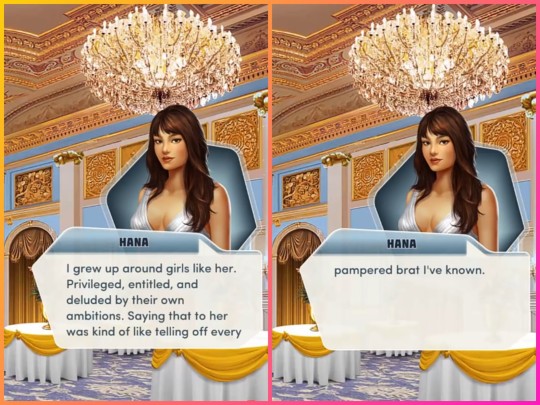
Sidenote: This is a pretty accurate take on Olivia (besides the "pampered brat" bit, considering her childhood), and I wish the narrative had addressed this instead of taking the route they did with the Olivia/Hana dynamic. Because it is important to acknowledge that Olivia has tons of privilege. It is important to call her out on her sense of entitlement, not once but several times. Hana shouldn't have had just this one opportunity to call Olivia out on her shitty behaviour, because Olivia never really learned from it, and both the narrative and the MC like her too much to actually bother correcting her.
In TRR2, Olivia occupies the position of the Outsider, alongside the MC. In the eyes of the court, Olivia mysteriously withdrew from the social season and the MC was disgraced - therefore they're not part of the new social structure that has formed around the future Queen. Both are not beholden to Madeleine, and Olivia herself has the freedom to come and go from the events as she pleases. Whether or not the MC liked Olivia before, their positions bring about some measure of solidarity. This - along with her friendship with Liam - leads her to becoming part of the core group.
Maxwell and Drake both express wariness when Olivia is first included in the group, but not so for Hana. The narrative instead has Hana constantly reach out to include Olivia in the group's activities; in fact in the chocolate party diamond scene, Hana is the first to invite Olivia to stay. This is a pattern consistently repeated both in this series and in TRH (for instance, Hana can convince Olivia to join her at a dance during Savannah's reception). The dynamics, too, tend to lean more towards benefitting Olivia. The MC and Olivia have to work to gain each other's respect (though honestly even without the relationship points Olivia winds up supporting you in the end), but Olivia never has to put in that amount of work for the rest of the group. They're all made to accept her into the fold without her changing her stance towards them (though Drake initially puts up a bit of a fight).
The subsequent books involve Olivia as a central character, with several important scenes. She is confronted with the truth of her parents' and Lucretia's plans (the childhood betrothal with Anton Severus), and is given a redemption arc that ensures that the final battle scene between the LIs and Anton is largely focused on her (eg. the watershed moment in that scene is when the MC can scream back the Nevrakis House Motto to encourage her), and has the Queen Mother herself confirm that she truly embodies Nevrakis spirit as a force for good. To make Olivia's image as a warrior-like figure even stronger, the narrative even retcons her ancestor Zenobia. The woman who gave up her kingdom over the fear that her hair would be chopped off, who was more comfortable watching bloodshed in the form of entertainment rather than in serious battle, whose most important moment in the war was to throw objects at soldiers who invaded her room...is suddenly hailed as a fierce warrior who hid daggers in her Winter Festival outfit.
At the end of TRR3, Olivia tells us she will read up to see if there are any "hidden deals or laws that will come and bite us later". She rarely follows through with this unless a crisis actually blows up, but TRH uses this as a springboard to involve her in various "spy missions" so as to give her more individual scenes. (To give you an idea of how invested the narrative was in giving her this space - Olivia had 2 individual "spy" scenes and a childhood scene in TRH1, and three "spy" scenes and a childhood scene in TRH2. Hana only got one childhood scene, in TRH2. Which means...that for all of TRH1 she got no solo scenes, and no solo childhood scenes).
Very few of these "spy" missions thus far culminated in much useful action (eg. Olivia finds out about Operation Swan in TRH1, sits on that information, and the next time we hear about it, it has already been enacted and Olivia's contact with the Queen of Rivala occurs only after the Auvernese have all but taken over Cordonia). Like Drake's own diamond scenes - Olivia's scenes are often pretty self contained. They're really more about the knife jokes, seeing her be "badass" in a leather jacket, and comparing herself to other spies like Jin and Amalas. The information she could gain is often secondary to this.
The dynamics of the group with Olivia from TRR3 onwards shows her more comfortably settled into the group, but the "spy missions" allow her to have storylines independent of them too. Her equation with the MC herself, while warm and friendly (Bestieeeeeee!!), seems to have a few similarities to the equation with Madeleine - the narrative allows her to assume superiority over the MC, and often the preferred dialogue options involve the MC herself deferring to her superior talents (eg. The book reading at Lythikos). This remains even though the MC can be her Queen. This could be due to the thrust-and-parry nature of their relationship, but it does tell us how invested the team (and the fandom, who easily lap up these scenes) are in centering her in the equation with the MC.
The writers were in fact so enamoured of Olivia and Lythikos that they gave her an entire mini-book, The Royal Holiday, where the entire core group visit the duchy to comfort/support their desolate friend after most of the Great Houses seem to have abandoned her (in the wake of the information about Anton Severus and the Nevrakis plans for a coup). It extols the wintertime traditions of Lythikos and has all of them keep her company and lift her spirits. This is indeed ironic, given her own attempts to mock someone else whose reputation was dragged through the mud.
Hana's equation with Olivia begins with the latter looking down on her, and effectively ends with the same. Only Hana's attitude is expected to change.
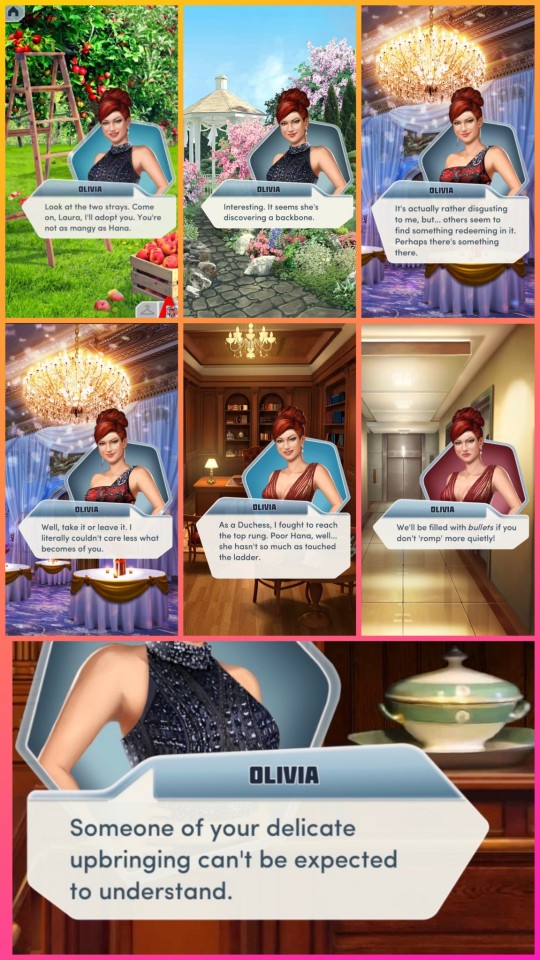
She implies Hana didn't show a backbone until the public fight with her father. She issues backhanded compliments about Hana's diplomacy. She calls Hana a failure in front of her mother for the broken engagement/not being chosen by Liam, even when Hana is on the verge of becoming a Duchess. She looks down on Hana's "delicate nature'' and seems skeptical of her capabilities. There is an extra level of vitriol in the way Olivia speaks of Hana, that doesn't match either the way Hana is, or the way she's allowed to talk to Olivia. Not only this - Olivia seems to relish speaking of Hana with disrespect and scorn. And the MC, who is supposed to be her friend/spouse, doesn't so much as bat an eyelid in most of these scenes.
Hana gets one solitary chance to push back against Olivia, in a 30-diamond scene at the end of TRR1, and is never given any more opportunities to do so from that point on. What is even more egregious about this is that this scene itself is never acknowledged thereafter. Or else why would Olivia, in my playthrough where Hana did the verbal equivalent of ripping out her spine, quip about Hana "discovering a backbone" after the confrontation with Hana's father in Shanghai?? One may claim that this has something to do with the previous scene being paywalled, but it wasn't impossible to have a similar free one. The team has done that before for other scenes. Hana is also made to acknowledge Olivia's talents, credit her for the good things she does (eg. She credits Liam for finding the loophole and Olivia for voting 'no' at the Coventus Nobilis), and to even include her in the group's activities. All without getting much in return from Olivia herself.
This isn't helped by the dichotomy the narrative creates between the two women. Olivia is the tough warrior, Hana is the generous negotiator. If done well, a dynamic like this one would position the two as equally worthy of respect in their own right.
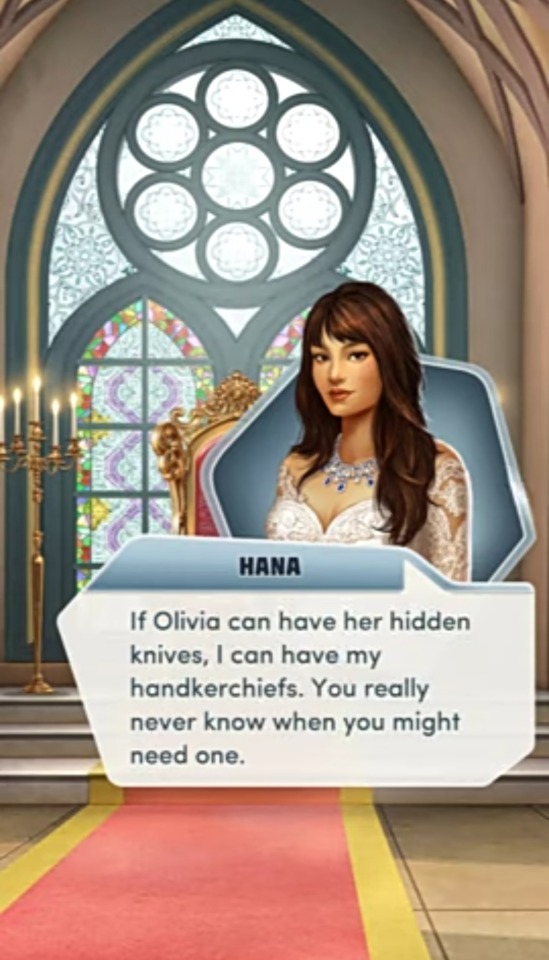
A good example of this would be this dialogue from Hana's playthrough during her child's Anointing Ceremony. Hana doesn't insult or undermine Olivia's interests, but emphasizes that hers are just as important (a pity there is no equivalent of this in her Single playthrough). Another good example (and a rare one from Olivia's end) is Olivia's response to Hana's outburst at Neville in the Beer Garden (TRR2 Ch. 17), where she tells Hana she should be proud of herself for facing him "with courage". Unlike their discussion at the Costume Gala, she does this without needing to attach insults. But the narrative very very rarely allows Hana to benefit from this kind of solidarity. And the most she is allowed when Olivia rakes up a scandal that Hana had no control over in front of her mother, gleefully aware that Hana is listening - is to glare at Olivia as the MC downplays the insult ("Well. At least Olivia got the job done". Interestingly, the MC can hit back at Isabella when she says literally the same thing, but the narrative has Olivia act angry about it as if she never said that!).
What the narrative does instead, is to position - without actually saying the words - Hana's emotions, Hana's diplomacy, Hana's silent way of working through these issues, as weakness. What it does is attempt to make Olivia sound like she is better, and this is achieved by ensuring that Olivia gets away with this behaviour, and that Hana continues to accomodate for Olivia in a way that the latter will never do for her.
But perhaps the worst thing about this dynamic is how the narrative tries to erase and rewrite Hana herself, to make Olivia better in comparison. The Hana who is a master at researching other cultures, is suddenly made to look small and scared if she and the MC visit Auvernal without Olivia's help, whereas Olivia is made to appear knowledgeable. The Hana who carried a large part of the TRR2 investigation on her back, bears no resemblance to the silly woman who talks about "romping" and adventure, and quips about "only killing when necessary" in the middle of a stealth mission, just so Olivia can look like she's the one leading the group ("Stealth! Right!"). We must remember that in the previous series, esp TRR3, Olivia showed an inability to read the room in tense situations (eg. Her calling the Ebrims "cowards" when they decline the invitation for the wedding due to an environmental crisis in their estate. The group has to scramble to cover up for her, and even then she fails to take a hint). While she has good deduction skills, she tends to be rash and impulsive. To make way for Spy!Olivia, and to ensure Hana couldn't steal her thunder, they practically retcon Hana's own skills, and give Olivia qualities she didn't exactly possess earlier - and this is never more obvious than in the TRH2 Olivia-MC-Hana spy scene, where Hana's behaviour borders on bizarre and OOC. I mean, there are ways to incorporate flaws into a seemingly "perfect" character, but this way of doing it sounds more like it was meant to benefit Olivia than Hana herself.
One should not ignore the role class and race (which I will speak of in another essay) play in these dynamics as well. As I've mentioned both in this essay and the last, that Hana starts out as a Lady, and (unless the MC chooses to marry her) stays that way all through the end of the series. Despite her lengthy list of qualifications, she has no lands of her own, no real home in Cordonia, and no title of her own either. And in a lot of ways I think it was written that way on purpose.
In Hana, the writers had managed to create a woman who would be smart enough and versatile enough to be of use to the MC...but always kept at a position of lesser power, always in a position of doing things for other people who were not as qualified as her. To achieve this, they ensured that she started out having no friends, with no clear rubric for what a normal friendship would look like. This resulted in her showing gratitude for the smallest kindnesses we tossed her way, while never acknowledging the times we failed to support her, while never having the opportunities to push back against more powerful women like others did. As much as the narrative would like us to pretend that the MC doesn't change from the "normal", sassy commoner of TRR1, the fact remains that with her aquisition of power her relationships and her priorities do change, and Hana is often at the bottom of her list. What this results in is a scenario where a Lady Hana cannot push back against a Countess or a Duchess, and her Duchess friend/wife likes said Countess or Duchess (or doesn't care) too much to actually call them out on their bullshit.
Conclusion
If I were to put this entire essay in brief, it would be to say this - whether you're a main character or a side, one thing is for certain. The more the MC likes you, the less she cares about how you treat her friend and staunchest ally. The MC's view of their treatment of Hana is dependent upon her relationship with them - if the narrative wants her to pander to them, it will downplay, retcon or erase how they treated Hana. And this wouldn't be as big of a problem if Hana herself was given the space to push back, but often she is forced to place the MC/group's comfort first. It is a never ending, vicious cycle that affects Hana's story and her characterization, while lifting up other characters.
You will notice I left out one courtier - Kiara. And that is because she is the exception to all these narrative rules, in every possible way. She is from a noble family, she "doesn't immediately agree with everything the MC says" (a claim that many Madeleine stans repeatedly use to explain away the general dislike for this character, as well as their love for her), she is experienced, she is talented. By all rights we should be seeing similar patterns in her story, but we don't. Like Penelope she comes from a Great House, yet her trauma and her struggles are ignored and minimized. Like Olivia she has her own perception of strength, yet the narrative prefers to oversimplify by framing it as "mean". And a lot of the compliments paid to Madeleine about "playing smart" and "being efficient" would be more appropriate when describing Kiara, yet she only gets these compliments when the MC and group need to use her. All three of these white women exhibit classism in some way or form, but it is Kiara (Drake-loving, Savannah-tutoring Kiara) who is labelled a snob. Despite their own cruelties towards us, the narrative expects us to coddle, pamper and praise them. But when Kiara doubts us even a little, on the (flawed) evidence she has, we have the chance to suspect her of evil and then never forgive her. Drake Walker gets to voice suspicions of her, again and again and again, book after book, while rising valiantly in Penelope's defence. The patterns are overwhelming, and the end result is always rather bleak.
Characters like Olivia and Madeleine (especially) tend to be popular among many wlw, and straight white women - and the TRR team writes them with characteristics and tropes often found attractive in white female characters (the Alpha Bitch, the Girlboss, the Strong Female Character). The WOC in the same book are treated with far less care in the books, and are set up to far higher standards in the fandom.
So it shouldn't surprise us that when the noblewoman is black, we're allowed to treat her with disrespect. And when the white noblewomen insult, abuse, scorn the lone brown woman, it is the duty of the brown woman to put the MC's needs before her own. To grin, bear it, and move on. And then act like it never happened.
(To see more of my thoughts on Kiara's treatment in TRR/H, read these:
To Be Not Heard: Kiara, Penelope and the Question of Validation
Though on Kiara in TRH2's Finale Scene)
Next: Power Dynamics, Part 3 - Lorelai and Xinghai
#long post#hana lee#hana lee: a study in erasure#the royal romance#the royal heir#the royal finale#anti penelope ebrim#anti madeleine amaranth#anti olivia nevrakis
75 notes
·
View notes
Photo

Kiara deserves a better friend.
37 notes
·
View notes
Text
Penelope sucks and I don’t like her, but I also do find her a relatable character. She has anxiety and her beloved poodles help her cope. I have anxiety, and my birds help me cope. My birds are really my very best friends and I love them more than life itself. So while I hate Penelope for her role in MC’s scandal/assault, I do relate to her on the mildest of levels.
#choices stories you play#playchoices#choices stories we play#pixelberry#pixelberry studios#anti penelope ebrim#trr#choices trr#choices the royal romance#the royal romance
11 notes
·
View notes
Text
Six Sentence Sunday

Thanks for all the tags from several people.
I’m currently working on several different things, which is unlike me, and I’m not sure I’m even going to post the newer ones I have, but here we go ...
Fools Rush In -- Chapter 18 (I’m really trying to wrap this one up soon)
Without sound, no one could ascertain specifically what was said among the two women, but it was clear Riley was not a willing participant in the conversation. But the disk held up in the Countess' hands, and the look of sheer horror on his wife's face told him all he needed to know. This was a blackmail situation, plain and simple, that included assault -- a treasonous act that Liam would ensure his ex-fiancee would pay for handsomely.
After they replayed the footage several times, the Royal Guard was immediately summoned to Krona to find Madeleine and take her into custody. Liam knew it was a long shot whether or not his guards could pull this off, but he was working with what he had at the moment.
Despite whatever happened next, there was one thing the King was confident of: He was prepared to give up his entire Kingdom to get his girl back. Returning to Cordonia without her was not an option.
A Beautiful Ending -- This is a mini-series I started probably in 2019 and decided to just go ahead and write it. I swore I’d never write this type of plot, but I found inspiration and I’m going for it.
A tiny shadow rippling on the edge of the shoreline pulled him from his thoughts. It was a welcoming intrusion, one that humbled him and kept him on his toes for the past five years.
Liam peeked down to watch his daughter, emulating his every movement. Not that he minded in the least. It was rather endearing the way she often copied him or her mother, all the while insisting she was her own "woman."
He shook his head with an amused grin, taking in her dainty curls, bouncing and bobbing with each change in the wind's direction. She must have sensed he had stopped burying his feet, because she followed suit and looked up to him with a puzzled expression.
"Why did you stop, Daddy?"
"No reason. Thought I'd admire my little shadow instead," he replied, before leaning down, swooping her up in his arms, and tossing her tiny body over onto his broad shoulders. Giggling heartily, Gracie kicked her feet while struggling to get away from the major tickling on the sides of her ribs and tummy.
That sound. That beautiful, innocent sound -- one he would gladly slay the world for -- was why he would never make the same mistakes his father did.
Where The Green Grass Grows-- The Country AU, a continuation of Burn’s Birthday fic.
Sweeping away imaginary dust from her shoulder, Olivia formed a sharp-toothed grin as the pair reluctantly approached her.
"You're looking ... well," Olivia observed as she scanned him over critically. "A little trimmer in the middle, I see."
Anton let out a proud chuckle, running both hands over his leaner tummy. "I'm down 15 pounds, thanks to my Maddie-poo." He leaned over and placed a loud peck on her bright red lips: Madeleine cooed and wiped away the evidence from his lips with her thumb.
Olivia sneered. "And what exactly did your ... Maddie-poo, do?"
"Weight Watcher," Anton exclaimed proudly.
"Weight Watchers?" Olivia responded incredulously.
"Penelope Ebrim has a group that meets at the old Pentecostal Church on Route 29 -- You know, the one the health department shut down last year for rattlesnakes and poisoned wine?" Madeleine piped in cheerfully. "My little Anty was getting too tubby, and I worried about his poor heart. Pen said she'd give him the first five pounds for free if we joined. I'm down three, and of course, Anty can't stop losing."
He's a loser, all right. Olivia pulled her cart back to maneuver around them; she was finished with this nauseating conversation. "Waylon. Travis. Say 'bye' to your daddy for now."
Anton smiled down at his sons before placing a hand on both of their shoulders. "Wait, Liv. I'm actually glad to have run into you today." He peered over admiringly at a grinning Madeleine. "Maddie and I have a bit of news to share with you."
Madeleine held up her hand that donned a silver band with a tiny diamond nugget, with barely a sparkle in the center, before squealing, "We're getting married."
Even though she tried to keep her composure, Olivia felt her breath hitch and her fist tighten. "Married?"
He shook his head proudly. "Yes'em. Next weekend. And I'd love to have the entire family there. Thought you'd be interested in giving me away," he joked.
"Married? MARRIED?" she hissed. "Boys, go pick out a box of cereal. Momma needs to talk to daddy real quick."
Anton clutched onto his sons harder, not letting them break free. "Now Liv, this is a good thing. We're moving on, getting settled into our new lives. We thought you'd be happy --"
"Waylon, take your brother to the cereal aisle now. Don't come back until I come to getchya. And if you hear your daddy yelling out in pain..." she reached down into the cart and picked up a heavy piece of meat. " ... it's just him trying to pull a pork roast out of his ass."
@burnsoslow you told me to tag you lol I’m not gonna bother anyone else with my craziness.
46 notes
·
View notes